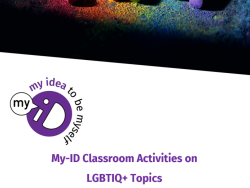My-ID compendium with classroom activities on LGBTIQ+ topics available

27 July, 2023 - The European “My-ID” project has published its English version of their compendium with classroom activities. The compendium contains 36 activities on LGBTIQ+ topics that teacher can implement in their classrooms. The activities cover social studies and biology/health, but also subjects like history, physical education, languages and mathematics.
The My-ID pedagogy
GAE’s former cooperation partner, Edu-Diverse, launched the My-ID initiative in 2011 in the Netherlands. After 20 years of working with schools to implement integration of sexual and gender diversity in schools and experimenting with different methods to facilitate implementation, Edu-Diverse described a new approach to school change. Rather than copying visibility demands of the LGBTIQ+ movement and trying to convince schools to “give space to LGBTIQ+ inclusion”, the new approach focused on promoting and supporting a broad set of tolerance and diversity skills, with explicit attention to challenging rigid norms that limit choices, like heteronormativity. In a range of projects in 2014-2018, the My-ID approach was further developed in schools for vocational education, and then during 2019-2021 tried out in a European partnership. Last year, the same partnership was extended with high schools and started to experiment with the My-ID approach in high schools.
The My-ID pedagogy focuses helping students and teachers to deal with conflicting emotions when they are confronted with sexual and gender diversity and with non-heteronormativity in general. This approach goes deeper then traditional LGBTIQ+ curricula and teacher trainings, which tend to focus mostly on role modelling (for example famous historic lesbians), visibility (for example safe space stickers) and direct behavioristic suggestions (like using correct pronouns). Many such programs are not that successful of not even implementable because they don’t take into account how to overcome resistance and how to integrate such suggestions in a natural way in the school routines. They suppose “visibility” will be enough to create awareness and then adoption of good practices, but mostly this does not work this way. The broad “My-ID” approach is very appealing for schools, makes it easier for them to implement LGBTIQ+ issues in their regular work and add to the general quality of school because it contains practical tools to promote emotional intelligence.
The compendium
The compendium with classroom activities is one of the products of the My-ID project for high schools. Previous My-ID projects focused in teacher training. In these trainings, teacher learned to understand in depth how heteronormativity creates negative emotions about sexual and gender “deviances” that do not conform to cisgender heterosexual expectations or norms. This emotional reaction is like a fight-or-flight response, and teachers need to learn how to deal with this before they can proceed with proper teaching. A challenge is that when teachers are confronted with negative reactions in their classes, they themselves also experience a fight-or-flight response. Their coping reaction is often to avoid conflict by directing their attention elsewhere or by punishing an offensive students. But this way they avoid “teachable moments” which are essential to diminish heteronormativity.
During trainings, teacher often asked for concrete activities they could do in the classroom, like traditional informative lessons, video and how to debrief them, individual and group assignments, games and role-play. These were not easy to find for them. The international My-ID partnership decided to develop a project in which they would develop such activities.
The compendium which has now been published consists of 36 classroom activities. They were developed by all partners in the project. Most of the activities turn out to have a relative traditional didactic format: an introduction about a subject, group work, discussion and debriefing. In the coming months, GALE will develop some more activities as examples of didactic methods to dal with LGBTIQ+ issues in and even less cognitive and more experiential and emotional way, like experiential games, simulations and role-play.
Sources: the My-ID project on the GALE website (most up to date with products and news); the English compendium; the teacher guide on how to choose and use activities; the official My-ID project website; for updated news, follow the My-ID Facebook page or the Dutch MijnID Facebook page


